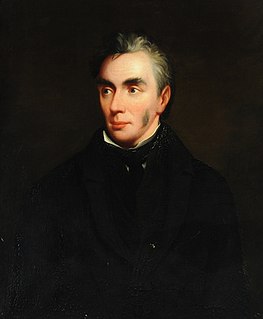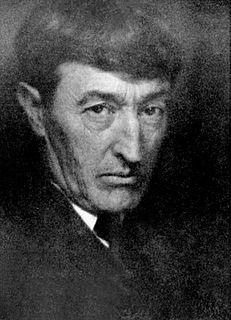A Quote by Ronald Ross
This day relenting God
Hath placed within my hand
A wondrous thing; and God
Be praised. At His command,
Seeking His secret deeds
With tears and toiling breath,
I find thy cunning seeds,
O million-murdering Death.
I know this little thing
A myriad men will save.
O Death, where is thy sting?
Thy victory, O Grave?
Poem he wrote following the discovery that the malaria parasite was carried by the amopheline mosquito.
Related Quotes
Thou shalt love the Lord thy God with all thy heart, and with all thy soul, and with all thy mind." I found the following quote by Goethe that can serve as a commentary on these words. "We are shaped and fashioned by what we love." "The most important thing a father can do for his children is to love their mother.
God is alpha and omega in the great world: endeavor to make him so in the little world; make him thy evening epilogue and thy morning prologue; practice to make him thy last thought at night when thou sleepest, and thy first thought in the morning when thou awakest; so shall thy fancy be sanctified in the night, and thy understanding rectified in the day; so shall thy rest be peaceful, thy labors prosperous, thy life pious, and thy death glorious.
Reviving Spring, a toast to thy fresh lips! Thy blush is music, and e'en heaven lurks In thy thick perfumed hair that hangs about Thy flowered shoulders like enchanted rain; Thy sigh is song and thy soft breath a balm, Dispelling death -- soft loosing his cold grip, Unravelling darkness in the heart of pain, As o'er dank waters rings the laugh of dawn.
Written in support of abolishing the Corn Laws, it became Elliott's most famous poem. The Peoples Anthem When wilt thou save the people Oh, God of mercy! When? Not kings and lords, but nations! Not thrones and crowns, but men! Flowers of thy heart, of God they are. Let them not pass like weeds, away Their heritage a sunless day! God save the people! When wilt thou save the people? Oh, God of mercy! When? The people Lord the people! Not thrones and crowns, but men! God save the people! Thine they are, Thy children, as thy angels fair, Save them from bondage and despair. God save the people!
Thy husband is thy lord, thy life, thy keeper,
Thy head, thy sovereign; one that cares for thee,
And for thy maintenance commits his body
To painful labour both by sea and land,
To watch the night in storms, the day in cold,
Whilst thou liest warm at home, secure and safe;
And craves no other tribute at thy hands
But love, fair looks and true obedience;
Too little payment for so great a debt.
At last I took one big, callused hand and slid forward so I knelt on the boards between his knees. I laid my head against his chest, and felt his breath stir my hair. I had no words, but I had made my choice. "'Whither thou goest,'" I said. "'I will go; and where thou lodgest, I will lodge: thy people shall be my people, and thy God my God: Where thou diest, will I die, and there will I be buried.' Be it Scottish hill or southern forest. You do what you have to; I'll be there.
The lily I condemned for thy hand, And buds of marjoram had stol'n thy hair: The roses fearfully on thorns did stand, One blushing shame, another white despair; A third, nor red nor white, had stol'n of both And to his robbery had annex'd thy breath; But, for his theft, in pride of all his growth A vengeful canker eat him up to death. More flowers I noted, yet I none could see But sweet or colour it had stol'n from thee.


































